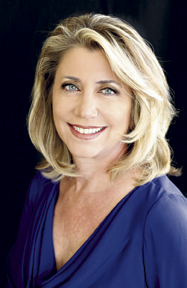BROKEN GLASS
CHANGING LANES
An aspiring writer “gives insurance a try” and becomes a successful agency owner
By Elisabeth Boone, CPCU
Stories abound of people who fell, were pushed, or were dragged kicking and screaming into the insurance business. Careers in our industry aren’t seen as glamorous or sexy, let alone as a pathway to wealth and prestige.
Despite—or perhaps because of—having two “insurance parents” (Dad was a district manager with Prudential Life and Mom supervised the commercial lines department at a property/casualty agency), Anita Byer definitely wasn’t planning to follow in their footsteps.
“I dreamed of being a world-renowned writer,” she says, with just a touch of regret. “After college graduation I inter-viewed at newspapers, magazines, ad agencies—and I soon learned that entry-level writing jobs came with entry-level, non-living wages.” Recently married and on her own financially, Byer sought the advice of her mother, who said, “Why don’t you try insurance? It’s such a nice career!”
“I interviewed with three firms, and I accepted all three jobs,” Byer says with a laugh. “I was 21 years old, and my mother said, ‘Sweetheart, you need to pick one of them.’ I went with my gut, and from the day I started, I loved it and never looked back.
“Nothing is more gratifying than helping businesses and families protect their assets, while working to uncover and minimize their risks,” Byer declares.
To keep her hand in as a writer, Byer shares that, for some time, she was a contributing author to the sales column of the former American Agent & Broker magazine. She also founded and owns The Human Equation, an e-learning company, and has authored some of its online courses. “I took my love of writing and created an avocation out of it,” she explains. “I blended that love of writing and my knowledge of insurance into a business model that addresses my clients’ need for information.”
Like many newcomers to the business, Byer started her career as an account representative on a personal lines desk. “I had a wonderful employer and mentor,” she says. “Sadly, that relationship ended when I asked to be part of the commercial lines agent sales training program.
“I’d looked around the agency and observed that the successful people, the respected people, the people who made the wheels turn, were commercial producers, and that’s what I wanted to be,” Byer recalls. “My boss’s response was: ‘Women can’t do commercial insurance.’
“Coincidentally, at that time my father was being transferred from North Palm Beach to Hollywood (Florida), so my mother needed to resign from her job and seek new opportunities,” Byer continues. “She told a CNA rep that she’d be leaving, and he asked if she’d be interested in opening her own agency with CNA as the lead market.
“My mother was intrigued with the idea and called to tell me about the offer,” she notes. “I gave notice, and my mother, my sister, and I started a small agency in Plantation, Florida.”

—Anita Byer
Co-founder and President
Setnor Byer Insurance & Risk
Small start, big progress
“To this day, I remember the smell of the office, the color of the carpet, and the sound of my mother’s vintage adding machine,” Byer remarks. “Most vivid is my memory of labeling and placing our first customer file in the file cabinet. Those were exhilarating times.”
About five years later, Byer’s mother became seriously ill and unable to work, so Byer and her sister, still in their 20s, soon were running the largest CNA personal lines shop in the country. “We were writing 45 new policies a week and earning quite a reputation,” she recalls with a chuckle.
“In those days there was no artificial intelligence or big data, so underwriting was pretty unsophisticated,” Byer adds. “As a result, CNA’s fastest growing book of personal lines business in the country soon became its largest economic loss.” Subsequently CNA withdrew from the personal lines market in Florida.
“The next catastrophe was Hurricane Andrew in 1992,” Byer continues. Andrew was a powerful Category 5 hurricane that slammed South Florida with winds up to 165 miles per hour and did extensive damage there, as well as in Louisiana and the Bahamas.
“Eighty percent of our personal lines markets left Florida after the hurricane. At that point, my sister and I looked at each other and said, ‘Maybe we need to do commercial.’ Over the next 10 years we made the transition to a largely commercial firm; and just as things were settling down, my sister left the agency to pursue a career in law and public life. She’s a former state senator, lawyer, and successful lobbyist, and I couldn’t be prouder of her,” Byer says.
Setnor Byer Insurance & Risk today is one of Florida’s largest privately held independent agencies and offers property, casualty, and employee benefits products and services to a wide array of clients. Byer is sole owner and serves as president while also overseeing new business development and the firm’s risk management offerings.
“We have a very sophisticated business model,” Byer says. “We have about $40 million in gross premium, and a lot of firms our size don’t take the same approach; that helps us stand out in the marketplace.”
Resolved to keep her agency independent, Byer didn’t pursue private equity financing or business loans. “I never took the path of getting super-big or borrowing money to fund growth. I make a very nice living, and I have a very peaceful life,” she says.
Today, Setnor Byer employs about 30 people and outsources its claims, accounting, and certificate processing functions. “I used to think that having 200 employees was a sign of success,” she remarks. “Then I realized that the true sign of success is your bottom-line profit.”
Changes in attitudes
Having begun her insurance career some 30 years ago, Byer encountered numerous variations on the theme “Biology is destiny.” As recounted earlier, her first boss told her flatly that women couldn’t sell commercial lines. “I watched male producers enjoying long lunches while women stayed in the office and worked,” she recalls. “In the early days of my career, some of our company reps were wonderful people, but the underlying dynamic was still strongly pro-male, and very few women were in leadership positions.
“I also heard some men repeating myths about the relationships between women, such as ‘women fight, ‘women gossip,’ and ‘women don’t support each other.’ There was a lack of respect for the character of the female,” Byer observes.
Another popular fiction, she continues, was that when a woman got pregnant, she would leave the workforce. “If we were ambitious, we had to have a screw loose,” she adds. “A lot of men didn’t know how to deal with a confident, assertive woman.”
Fast forward 30 years, and it’s a different world, Byer comments. “I’m pleased to be living at a time when women are accepted and supported in business settings,” she says. “More needs to be done, but we’re light years away from the blatant discrimination and prejudice we experienced as youthful newcomers to the industry.”
We asked Byer what qualities she thinks women bring to leadership positions in independent agencies.
“A lot of us who are seasoned veterans in the business started behind a desk in service positions, so we have a deep understanding of agency operations,” she responds. “We are effective at making decisions about workflow and software solutions. Because I could fill out an app by hand, underwrite the risk, rate it, analyze an experience mod, and process all the paperwork, I know how an agency works,” she asserts.
As a woman leading other women, Byer believes she has insights and perspectives that help her manage her team effectively. “I drive my team and expect them to reach for the stars, but I combine that push with mentoring, continuous feedback, and compassion.”
What opportunities does Byer see for women who are considering a career with an independent agency?
“The opportunities are limitless,” she declares. “There’s the potential for high pay, the flexibility to work part time or work from home and, in regions like ours, there’s high demand for skilled, motivated employees. I think there may be four jobs open for every qualified person, so applicants can be highly selective about where they choose to work.”
What’s not to like? Not to mention that to those of us who are locked in the grip of a midwestern winter, a dose of that Florida sunshine sounds mighty appealing.
Do you know a female independent agency leader we should feature? If so, please email details about her as well as contact information to Elisabeth Boone, CPCU, senior features editor (elis.boone@icloud.com). We’ll take it from there.





